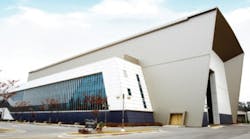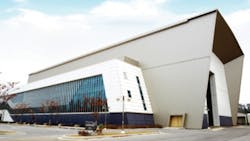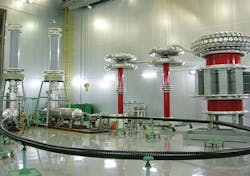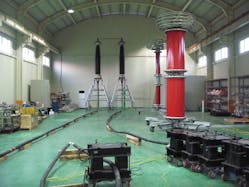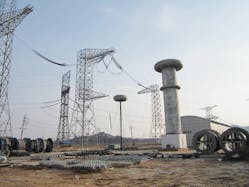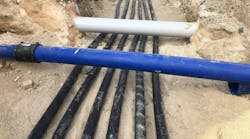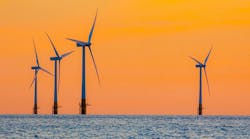The power testing centerinthe Research Institute of the Korea Electric Power Corp. (KEPCO) is a multi-purpose testing site for power transmission and distribution technology developments. The outstanding testing facilities, human resources and optimized testing processes are used to evaluate and verify the latest power technologies and results of research and development projects.
Since 1989, it has been equipped with the various core facilities for mostly the testing of KEPCO’s transmission and distribution system components. Now it has major testing facilities such as the real-sized overhead 765-kV double- and single-circuit test lines, 500-kV high-voltage dc (HVDC) test lines, electromagnetic field test lines, distribution system testing facilities, renewable energy testing facilities and high-voltage cable testing facilities recently used for high-temperature superconducting (HTS) cable testing.
Currently, the KEPCO transmission system includes about 1,843 circuit miles (2,967 circuit km) of underground cable, and the rate at which extra-high-voltage cables are now being installed is increasing. Hence, KEPCO identified a need to establish a new underground cable testing laboratory (UCTL).
Following a five-year construction program, the KEPCO Research Institute completed the world’s largest underground cable testing laboratory in February 2010. Located in Korea’s Kochang Province, the UCTL is designed for long-term reliability evaluation tests, service life estimation tests, real field operation simulations, and mid- and long-term tests for extra-high-voltage HVAC, HVDC, HTS and gas-insulated transmission line (GIL) cables and joints.
Underground Cable Testing Laboratory
The UCTL was constructed to perform international-accredited-type and power-quality (PQ) tests for underground cables. It acquired accreditation qualification of the International Organization for Standardization/International Electrotechnical Commission (ISO/IEC) 17025 from the Korea Laboratory Accreditation Scheme in March 2011.
The UCTL can help customers to confirm the quality of cable systems that are to be introduced into real power networks and prevent potential problems in future operations of new cable systems by performing various accreditation tests.
Cable Testing Equipment
The UCTL is composed of a test hall and control building 148 ft (45m) wide by 377 ft (115m) long by 85 ft (26 m) high with atotal floor area of about 387,501 sq ft (36,000 square m). The facility includes five loops of real-sized test tunnels and civil engineering structures likea HTS cooling system.
Testing Examples
Following are examples of the underground cable testing completed at the UCTL:
- Type test for 154-kV ac HTS cable. The 154-kV HTS cable was developed to meet operating conditions for the Korean power network and has a higher-voltage rating than that of previously developed 138-kV HTS cable. Currently, a PQ test is being executed for the 328-ft (100-m)-long sample of HTS cable. As there is no clear international specification for the HTS cable, the IEC 60840 ac cable testing specification with necessary modifications is being applied. It is anticipated, in the near future, KEPCO’s testing results will contribute to the establishment of an HTS cable testing standard.
- Type tests for ±180-kV and ±250-kV HVDC mass-impregnated submarine cables. These cables were installed as the cable systems for Jeju-Haenam subsea interconnections No. 1 and No. 2, respectively. They were installed in 2008 and 2009, respectively. More recently, KEPCO has finished the test program for the ±80-kV HVDC cross-linked polyethylene (XLPE) land cable for the Jeju Island smart grid evaluation project.
- PQ tests were conducted on 154-kV cables to evaluate and confirm the construction technology used for the premolded joint for the XLPE-insulated cables based on IEC 60840 and CIGRÉ Recommendation 303 expand qualification test. Also, PQ tests on a 345-kV GIL was executed for six months in 2011.
Accreditation Tests
KEPCO UCTL has acquired accreditation qualification from the Korea Laboratory Accreditation Schemefor cable testing according to ISO/IEC 17025, so it is now possible for the laboratory to do accreditation tests for 16 items in accordance with nine international standards.
The KEPCO Research Institute and KEMA agreed on the memorandum of understanding to jointly perform international accreditation tests for cable systems in April 2011. Based on this memorandum of understanding, the KEPCO Research Institute and KEMA signed a contract to undertake commercial accreditation tests. According to this contract, type and PQ tests for 500-kV XLPE cable and accessories manufactured by Iljin Electric Corp. were performed shortly thereafter.
KEPCO UCTL anticipates it will carry out various international accreditation tests from China and the Asian countries.
Future Work
In accordance with the long-term master plan, the KEPCO power testing center is being expanded continuously to serve as the worldwide authorized testing organization. In the next year, an ±80-kV dc HTS cable system will be tested and evaluated for a renewable energy connection in a smart grid project.
Additionally, KEPCO plans to build a wind power generation complex with a 100-MW capability and real test lines for connection to power networks. The facility will offer the opportunity to evaluate an offshore wind-power submarine cable system and hybrid ac-dc cable systems.
These activities will make the UCTL an all-around cable testing organization for renewable energy systems as well as conventional power systems.
With all that it offers and will offer, KEPCO UCTL anticipates it will become a leading international cable-testing organization for a multitude of power and energy systems.
Jaewon Chang ([email protected]) is president of Korea Electric Power Corp. Research Institute. He received a Ph.D. degree in electrical engineering in 1996 from Rensselaer Polytechnic Institute in the United Sates. He was a member of CIGRÉ SC C1 until 2009.
Dongil Lee ([email protected]) is head of the power system laboratory at Korea Electric Power Corp. Research Institute. He received a Ph.D. degree in electrical engineering in 1996 from Hanyang University in Korea. He was a member of CIGRÉ SC B2 until 2011 and has been a member of CIGRÉ SC C3 since 2012.
Jiwon Kang ([email protected]) is a principal researcher in the power system laboratory at Korea Electric Power Corp. Research Institute with a focus on underground cable systems He received a Ph.D. degree in electrical engineering in 2003 from Hanyang University in Korea.
